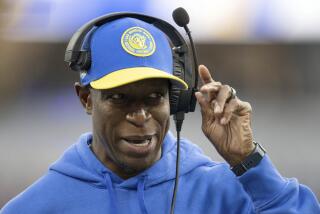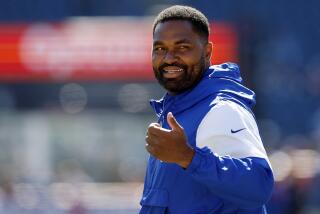Relearning to fly
- Share via
The Atlanta Falcons weren’t a team, they were a toxic spill. That meant Coach Mike Smith needed not only a hat and whistle, but a hazmat suit.
There were the Michael Vick scandals, run-ins with the law culminating in dogfighting charges that put the star quarterback behind bars.
There was the failed Bobby Petrino experiment, in which the coach was loathed by his players and wound up quitting for a college job before the NFL season ended.
Then there was the public fallout, not only from animal rights advocates outraged about Vick’s behavior but from disenchanted fans who jumped ship in droves. One player said even his family members stopped asking for tickets.
Smith, the coach with the NFL’s most ordinary name, was faced with the extraordinary challenge of rebooting -- and rebuilding -- a franchise that had fallen on its hardest times.
So far, so good.
The 4-3 Falcons have already matched their 2007 victory total, and will be in the thick of the NFC South race if they can win at Oakland today. All this, and they have rookies at quarterback, left tackle -- until Sam Baker was sidelined by back surgery -- middle linebacker, third receiver and nickel back.
Oh, yes, and a rookie head coach.
“We wanted to put 2007 behind us,” said Smith, Jacksonville’s defensive coordinator for the last five seasons. “Whatever happened in the past was the past. Everybody was starting with a clean slate.”
Someday, we all might say the Falcons had a sixth sense when they picked Smith. But consider this: He was their sixth choice, behind Bill Parcells, Bill Cowher, Pete Carroll, Tony Sparano and Jason Garrett.
If hiring Smith was a risky move, it wasn’t Atlanta’s first or its most recent. The Falcons have made several leaps of faith in this season of redemption, starting in January, when they hired Thomas Dimitroff as general manager without meeting with him in person. He was New England’s director of college scouting, and because the Patriots were in the playoffs, his interview was conducted by webcam.
Ten days later, Dimitroff hired Smith, who was respected in football circles but anonymous outside of them. The two agreed that the best way to build a new foundation for the Falcons was through constant and unfailing communication, something that was severely lacking in the brief Petrino regime.
They were also charged with restocking a roster loaded with standout players on the downside of their careers such as running back Warrick Dunn, tight end Alge Crumpler, linebacker Keith Brooking and tackle Wayne Gandy.
The goal was to keep some of those seasoned veterans while surrounding them with the type of young players who will form a solid core down the road.
“In coaching, one eye has to have a telescopic lens and the other one has to have a microscopic lens,” Smith said in a phone interview. “You have to look out in the future, and at the same time you have to look at all the little things and make sure you’re doing all those right.”
In early March, the Falcons made it clear they were serious about improving. They signed running back Michael Turner, a gem of the free-agent class, who, as LaDainian Tomlinson’s understudy in San Diego, showed he was good enough to be the starter just about anywhere else in the league.
Several weeks later, the Falcons used the third pick in the draft to select Boston College quarterback Matt Ryan, even though many thought Louisiana State defensive tackle Glenn Dorsey was a better fit.
Not only that, but the Falcons made Ryan the richest rookie in NFL history, signing him to a six-year deal worth up to $72 million, with $34 million of it guaranteed. The keys to the offense were in his hands, and -- in case anyone questioned it -- the Vick era was officially over.
Later in the first round, when there was a run on offensive tackles, Atlanta traded up to grab USC’s Baker with the 21st pick. He started five of the first seven games before being sidelined because of back problems. He underwent successful surgery last week, and said he hopes to rejoin the team soon.
Playing the most difficult position on the offensive line, he did a very good job of protecting Ryan’s blind side and was a key factor in the Falcons’ third-ranked running game, which has averaged 150.7 yards a game.
Then, there’s wide receiver Roddy White. He’s on a Pro Bowl pace, with touchdowns in the last three games, including two in last Sunday’s loss at Philadelphia.
The Falcons are not an elite team yet. But no one expected they would be. Not even close
They are non-toxic, though, and building toward a promising future.
In light of where they’ve been, that’s saying a lot.
--
More to Read
Go beyond the scoreboard
Get the latest on L.A.'s teams in the daily Sports Report newsletter.
You may occasionally receive promotional content from the Los Angeles Times.











